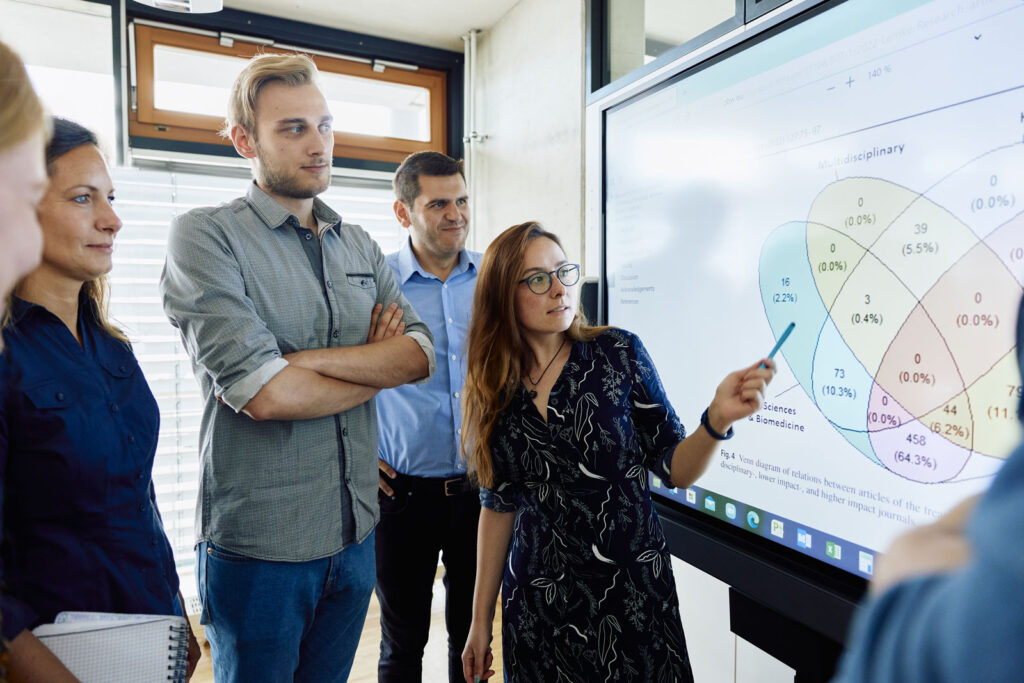ZBW – The world’s knowledge in economics.
Open Science as the “New Normal”
The ZBW vision for researching Open Science:
With its research, the ZBW wants to drive the rapid development of the Open Science transformation in economics. The ZBW studies the conditions for success and pilots infrastructures that contribute to making Open Science the “New Normal” in the scientific community. To achieve this goal, the ZBW will concentrate its research during the coming years on these topics:

Implementing and evaluating Open Science practices:
After a phase of theoretical exploration of Open Science and the formulation of normative goals, a phase of practical implementation and critical evaluation of Open Science now follows. This is clearly demonstrated by the fact that important science policy steps have been taken in recent years to anchor Open Science as a central building block for ensuring good scientific practice in the current transformation process of the science system.
Against this background, the ZBW will focus its research on “Policy to Action”. It will look at the relation between Open Access transformation and Open Science on the one hand and a rise in Fake Science with questionable research practices on the other. Another object of research will be the effect of open research practices with regard to diversity, inclusion and fairness in the science system.

Foto: Sven Wied
Open Science in economics:
The Open Science transformation in economics has accelerated considerably. This is demonstrated by the activities of data editors at scholarly journals, for example. There are increased efforts to improve access to the data and programme codes of publications, and to conduct more replication studies. New institutions are arising within the community whose long-term evolvement is still open.
The ZBW regards itself as an essential contact point for community building in the German and international landscape. It aims to help shape new institutions and to introduce new standards and practices to the wider academic community and university teaching. The focus of future research is therefore on the practices of data usage, with a special emphasis on studying the joint use and re-use of data.
Generative Artificial Intelligence:
Generative Artificial Intelligence, such as ChatGPT, opens up possibilities for innovative services in the area of literature search and information service. The implementation of large language models has the potential of substituting classical keyword searches. Instead it can provide answers based on queries in natural language to replace results lists based on metadata. The future research of the ZBW will study the development of search tools for research findings whose results can be generated on the basis of chat queries based on the content of the documents themselves. The application of large language models and knowledge graphs, customised for economics, enables the testing of new services, such as automated generation of abstracts and literature reviews. Information infrastructures especially for economics will be developed, and if needed, the ZBW will design, implement and pilot its own language models based on these new technologies.
Infrastructures for research, meta- and training data:
The development and piloting of infrastructures for research data will gain more and more importance in the next years. One of the great challenges will be to ensure the interconnectivity of our own infrastructures to the National Research Data Infrastructure (NFDI) and the European infrastructure European Open Science Cloud. Besides infrastructures for research data, infrastructures for metadata and training data will be objects of research. The focus of these studies will be on the harmonisation of metadata from our own and external infrastructures. The potential of using our own data as training data for optimising AI-based services will also be studied.

Foto: Sven Wied
All in all, the ZBW strives to establish a comprehensive Open Science culture which takes into account the diversity of different scientific disciplines and which fosters transparency, accessibility, retraceability and reusability in research.
Open Science AT ZBW
Research groups and their current topical focus
Digital Information Infrastructures
Transparency and openness: new infrastructures for digital resources in research
Information Profiling and Retrieval
Language models and knowledge graphs are the focus of ZBW research
Web Science
Studying the impact and relevance of scientific publications
Digital Economics
Science about science: studying research texts and processes
Engagement
Science policy consulting at the ZBW
The developments associated with Open Science take place at many levels of the science system. As a Leibniz institution, it is a matter of concern for the ZBW to see its own experiences and research results inform the debate in science policy bodies at the national, European and international level.
vision
Future
Lorem ipsum dolor sit amet, consetetur sadipscing elitr, sed diam nonumy eirmod tempor invidunt ut labore et dolore magna aliquyam erat, sed diam voluptua. At vero eos et accusam et justo duo dolores et ea rebum. Stet clita kasd gubergren, no sea takimata sanctus est Lorem ipsum dolor sit amet. Lorem ipsum dolor sit amet, consetetur sadipscing elitr, sed diam nonumy eirmod tempor invidunt ut labore et dolore magna aliquyam erat, sed diam voluptua.
